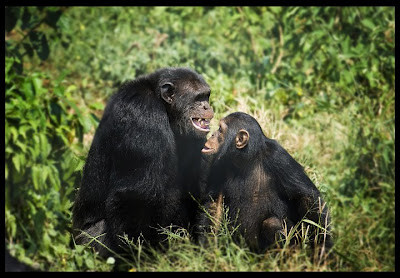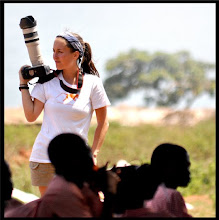
July 23rd: 8:10am
Yesterday was our first "work" day on the expedition and I think everyone really enjoyed putting their talents to work and collaborating as a team. We woke early and packed up all of the equipment to head over to Uganda's only Chimp Sanctuary located on Ngamba Island. The boat ride across Lake Victoria to the island took a couple of hours, during which I had a great conversation with Steve, our Australian driver. Steve has spent the majority of his life traveling to very remote areas of the world and is driving the overland vehicle through Kenya, Uganda and down through South Africa for all 3 Primate Handshake expeditions this year. Needless to say, he had some very crazy stories to tell of his excursions through South America, Papua New Guinea, Africa etc etc. He is also a pilot and when he is home, he takes his plane out for evening rides, much like Oteil and I do on the motorcycles. :) On a side note, while I'm thinking about it... Oteil! There are tons of motorcycles and scooters all over Uganda. They are all older motorcycles, I haven't been able to figure out what the make of many of them are, but they are definitely very old. A lot of them look similar to the build of Triumphs, but I can't be sure what they are. Many times you'll see three men piled on top of one flying down the bumpy road!
But back to Ngamba... When we pulled up to the shore of Ngamba Island we saw several huts that were staggered up the slope of the island. The island itself is about 1 square kilometer. There is a small section fenced off for humans which contains the huts, safari tents looking out over the water, med center and quarantine area for the animals. The rest of the island is dense forest and belongs to the 40 resident Chimpanzees, all orphans from the pet or bushmeat trade. I toured the island with the video team and while they captured footage of the daily running of the Sanctuary, I photographed the facilities, the staff, the resident Chimps. After a fantastic lunch of local fish, vegetables and rice provided by the staff, we were lucky enough to be able to follow the staff for the afternoon feeding for the Chimps. As we walked up to the platform, we could already see a sea of black bodies emerging from the forest, making a loud raucous. As the staff tossed in carrots, tomatoes, and chunks of watermelon and jackfruit, more and more Chimps began to appear from the foliage. The volume of vocalizations rose to a roar as the social heirarchy fell into play in competition for the food. The Alpha Chimp made his dominance clear when all of his silver and black hair stood on end, his muscles buldged out and he moved in a stiff, bulky, intense and powerful run towards anyone who came near his female or his food. Little skirmishes broke out all through the group and the pant hoots were interspersed with loud screams and other strange vocalizations as they chased each other around. Many of the younger orphans ran quickly to retrieve their treasure and escaped to the outskirts of the group, to the edge of the forest, where they swiftly devoured their snack before running back for more. I have never seen so many Chimpanzees interacting together at once and for the first time in my life I was able to see their complex social systems at work.. something I have only read about in books. It made the contrast of the behavior of animals in a zoo even more strikingly clear. Although the chimpanzees at the sanctuary on Ngamba Island are technically in captivity, they still possess that raw, natural behavior that is nonexistent in western zoos. Sadly enough, when you look into the eyes of an Ape in a typical zoo, your gaze is usually met with an empty stare, an extension of their broken spirit.
After a full day of photographing, I was also able to talk to some of the staff about what running a sanctuary entails, where they get their funding, what makes it work, etc etc. I am on a mission to gather as much knowledge as I can to work towards opening a sanctuary in the US. I realize that what it takes to run a sanctuary here in Africa is a much different thing altogether, but the ideas behind it can certainly be useful. Everyone here is aware of my goal to open a sanctuary for ex-biomedical research subjects and have kindly come and found me to tell of any piece of knowledge or info they have discovered which could prove to be of use.
After arriving back at the UWEC, everyone set up their laptops to begin working on the days footage/educational materials/research/photographs. I worked with Kate to get our first official Primate Handshake blog posted last night and then we all crawled in our sleeping bags for the night.
July 23rd: 9:30am
There was a beautiful sunrise this morning out over the lake.. After another delightful breakfast of porridge (what the English folks call it) and instant Coffee, we had a little stretching/yoga/massage session down on the grassy area below our work area led by David (a chef in London who also does yoga and body work). We are all now bent over our laptops, hard at work. There is a group of African women sitting in a circle next to us, surrounded by mounds of corn and vegetables and large cooking pots. It's a bit hard to focus because one of the women is carrying a chicken around by then neck in one hand, and in the other a large cooking pot. The chicken is not going quietly and she just took the future meal around the back of the building, out of view of all the curious and shocked Mazungas.
Off to work. Love and miss you all!

